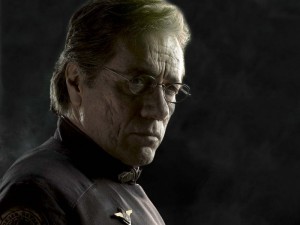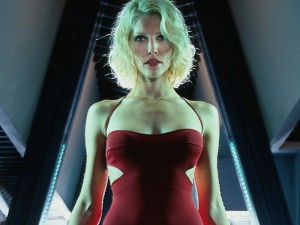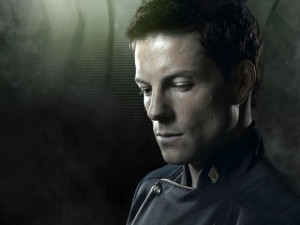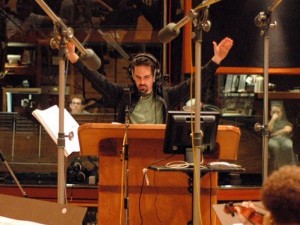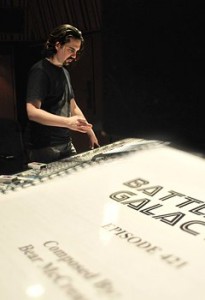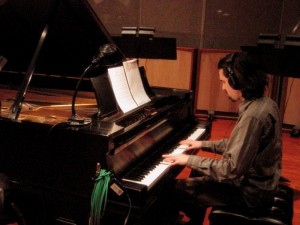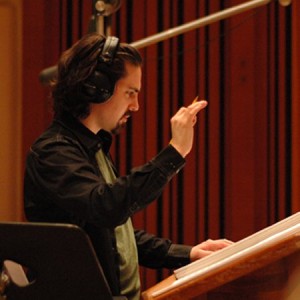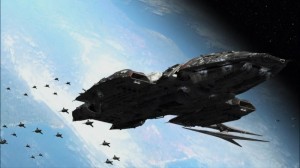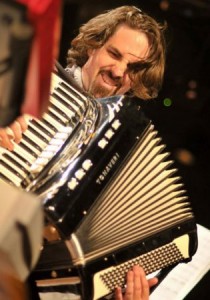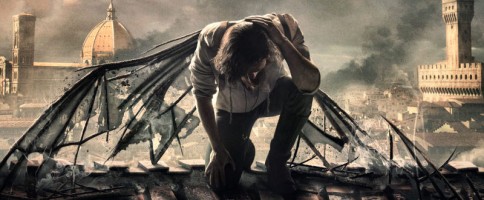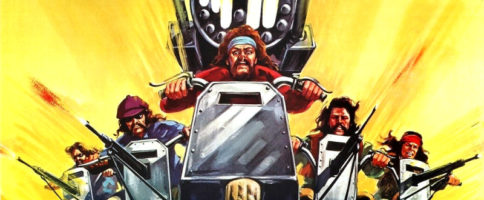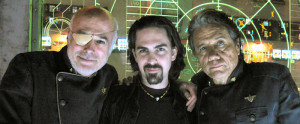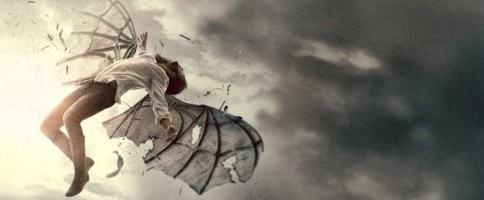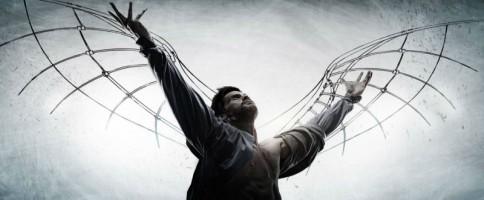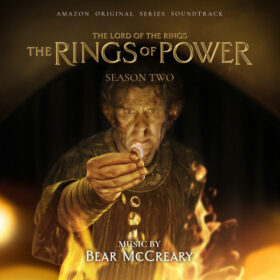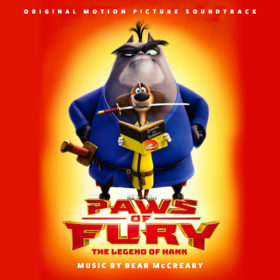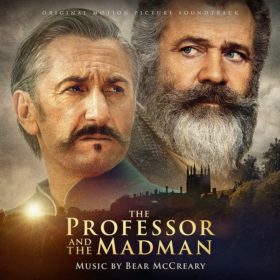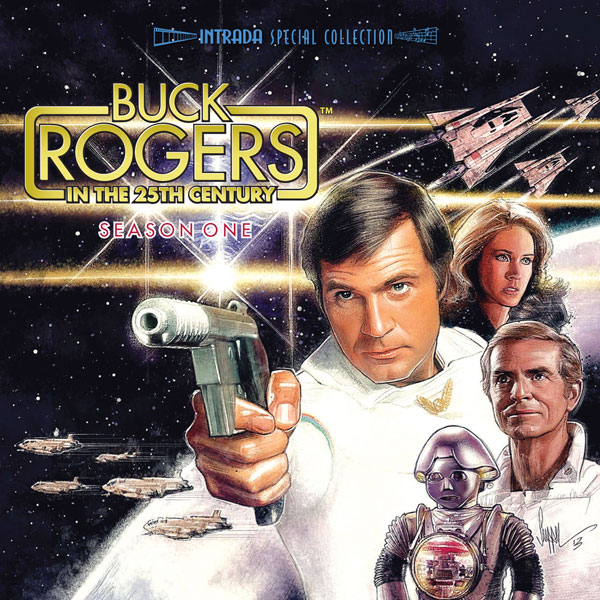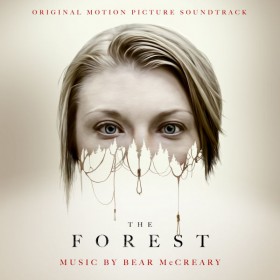The announcement of the undertaking, in 2003, of a remake of the Battlestar Galactica TV series, a wheezy copy of Star Wars produced in 1978 by Glen A. Larson, the future creator of Knight Rider, The Fall Guy and Magnum P.I., had everything to leave sceptical. However, thanks to the influence of Ronald D. Moore, brilliant producer of Star Trek: The Next Generation, Star Trek: Deep Space Nine and Carnivale, this re-imagining proved to be an unelikely surprise. Over the course of four seasons, Battlestar Galactica exceeded all expectations to become one of the most important series of the history of television, attaining a thematic, philosophical and mythological depth never witnessed before on TV.
Selected to compose the music for the mini-series broadcasted in 2003, Richard Gibbs was forced to leave the project right after scoring this pilot episode. Then a newcomer, Bear McCreary grabbed the opportunity. Season after season, he constructed a brand new musical universe, drastically different from what one could expect from a space opera, illustrating perfectly the world of Battlestar Galactica. Five years of such an essential collaboration that he was naturally chosen to score Caprica, the prequel and spin-off of Battlestar Galactica. During this lengthy interview, the young composer shared for UnderScores, with enthusiasm and spontaneity, his initiation journey within this extraordinary adventure.
Richard Gibbs composed the music for the Battlestar Galactica mini-series, then left and you replaced him as the main composer for the series. How did you manage it?
I’d certainly never considered topping him. It was always to me just a matter of doing what was appropriate for the episodes that were in front of me. I was trying to operate in the language that he had created, but at the same time the series had a lot of requirements that the mini-series didn’t have and, as the show expanded, the sound expanded as well.
What was your general approach when you started to compose for Battlestar Galactica? And how did it evolve during the course of the four seasons?
My general approach was to keep the score very intimate and small, to focus on the use of ethnic soloists and to consider that the instrumentation is coming from a sort of ancient place, that it comes from History. And that it comes from our History. That’s why I used tribal drums, vocals in old languages, the duduk and some other electronic effects that were in the style of these old sounds.
But as the show evolved, it changed considerably, and the instrumentation had to evolve as well. I brought in Gaelic instruments, rock n’roll, lounge music, Italian opera, a cithar, a lot of string guitar instruments. I brought in more vocalists and it really continued to expand and expand until it reached its peak in season 3, when we brought All Along The Watch Tower. Once that happened, the score could go anywhere, once we had established that we were going to do that. In season 4, it would open the door to do all kinds of amazing things.
The score is mainly driven by rhythm and percussions. Is it to suggest the beating heart of the last survivors of the human race, or the mechanical rhythm of the Cylons?
I never really thought about the mechanics of the Cylons in too much detail. If anything, I did a lot of that in another show that I did called Terminator: The Sarah Connor Chronicles, which is where I got to get all that stuff out of my system. My approach to the Cylons and the humans within the score of Battlestar Galactica was the same, because we learn about them both as people in these characters. So when I was scoring a scene with Number Six, if she was feeling an emotion, I was just going for the emotion of the scene. I didn’t really delineate between human and cylons because of course ultimately, at the end of the series, there really isn’t any difference, they join forces.
The Adama family theme has very Celtic roots. Is there a particular reason for it?
The reason comes from the episode in which it was introduced, an episode called The Hand Of God (season 1, episode 10) which is the first time that we brought the bagpipes. It’s also the first time that we really learn anything about Adama’s father, Lee’s grandfather. But it was also rather an interesting moment because that episode was a serious turning point in the writing of the show. That was one the first times that the show was allowed to have really pure warm emotions that were not tampered with shaky hand-held camera shots or edgy dark undertones. That scene between father and son was genuinely touching, and I wanted to play that up, but it almost did not work. When we were watching it on the dub stage, the producers almost pulled that cue out. The cue I’m talking about is called A Good Lighter on the season 1 soundtrack.
And then for the next episode, we went back to the more standard, dark score. But now that seed had been planted, and I was always hopeful that there would be more scenes like that, and that it could come back. And sure enough, in season 2, there were moments to just start bringing it back, the first of which was either in Scattered or Valley Of Darkness (Season 2, Episodes 1 & 2), I must confess I don’t remember. But there is a scene in season 2 where Lee is looking at his father lying on an operating table: he’s got a big scar, he’s recovered from the surgery and Lee is hoping that he’s going to survive. There is a little quotation of the Adama family theme there, and when I was able to quote it there, I knew that it was here to stay. And then from there it evolved and became more and more important.
Regarding your process, you have to discover each episode maybe one or two weeks before composing the music. How does it work exactly?
On Battlestar Galactica, I would never read the scripts. I would always just watch the episodes because I wanted to have a good, solid first impression. I didn’t want to know the story when I was watching them. I was sitting on and watching the show with the producers, then we would discuss musical ideas and try to figure out how we were going to do it. And then I would just sit down and I would have a few days to write the score, and I would set aside enough time to orchestrate it, record it, produce it and mix it. Every episode was its own adventure. There was not set schedule. On some episodes I had two months and some episodes I had three days and every timespan in between. Every episode had something a little different about it, every episode had usually a different sound, a different theme. There was never just a case of dropping in the taiko drums and the duduk and calling it a day, I was always developing the themes very carefully.
It’s only about the emotions to me. I never really sat down in the beginning and thought about the big picture. I never felt when I wrote the Adama family theme that I would bring it back fifty episodes later as the send-off when we are last seeing Lee and his father together. I never thought about things that big, I’ve just thought about the scene that was in front of me and the tools that I had developed to best communicate with that scene. So for me the thematic approach was the only and obvious choice to do this. I never really thought about it in any other way.
Why did you choose to use, on a few occasions, the original Battlestar Galactica theme by Stu Phillips?
The first time, I didn’t even choose, it was written into the script. In season 2, in the episode called Final Cut (season 2, episode 8), D’Anna Biers shows a documentary, and it says in the script something like « the old original Battlestar Galactica theme plays ». Originally they were just going to pull the recording for the old show, licence it and play it. When I saw that, I suggested them that we actually re-do the theme in our language, because honestly, the original show’s recording was so big and so bombastic that it almost felt like a joke, like a wink, like D’Anna Biers was putting this bombastic music to make a fun of it. Somehow it was just too much, especially because we had never heard of it before. It was too much. So I came up with this idea of rearranging the theme and still preserving its orchestral heritage while adding in the taiko drums and the ethnic instruments, trying to bring Stu Philips classic theme into our language.
They liked that idea and the first thing I did was to reach out to Stu directly. I went over his studio and he was gracious enough to see me and to show me his orchestrations and walk me through how he arranged and wrote this piece. He lent me his scores so I have all the reference scores to be able to translate his orchestrations correctly. It was just a delightful experience working with him, I’ve always really admired him. I very strongly believe that the reason that we’re remaking a new Battlestar Galactica is because of Stu Philips’ theme. I really believe that the theme he wrote is among the strongest aspects of the old show and it is almost undeniably the reason that it has resonated with people for so long. It sticks in your mind, it’s so memorable! So I really wanted to pay respect to that and I think that’s a real achievement. Stu probably was not happy when the new show came out and the thing that was the most different was the music. The ship looks the same, the characters have the same names, and the music was night and day, almost a rebuttal of what he had done. It was just a way for me to extend an olive branch and say to him that I respect his work and that I think it has a place in our new show. And of course again, this was one more step in the music evolution, and once that has happened, the door was opened to do it again. And so there was several other places where we brought it back.
Now that Battlestar Galactica is over, how do you feel?
I feel many conflicting emotions. First, I feel a great sense of completion. Just like the characters made an epic journey, I feel like I made an epic journey. When I started the show, I was 23 years old, just graduated from school, and I had no prospects for entering the business professionally. I just had my work ethic and my desire to write music. Now that the show is done, I feel like I’ve created something that people has responded to, and that’s why I wanted to become a musician in the first place.
The other feeling that I have is of course sadness, it’s the closest word. I’m sad that the show is over and it still pains me to talk about it in the past tense. I’m sure you’ve noticed that even in this interview, I always use present tense: « when I write the score » instead of « when I wrote the score ». It’s difficult because now, we are all in the past and we are, all of us, looking forward at the next step in our journeys. We come from a very wonderful place and I don’t think there will be another Battlestar Galactica. All of us that worked on the show are looking for things that are rewarding and fulfilling and exciting, but there will never be another experience like the one we had on Battlestar Galactica.
Have you finished working on The Plan? What can we expect musically?
Musically, The Plan really focuses on a lot of older themes. It focuses on Brother Cavil, Boomer, Number Six and Anders, and indirectly it really focuses on Anders relationship with Kara. So those five themes really play a huge part in the score. There is also a new theme: I just wanted to write one more! That’s what I consider the theme to The Plan: you hear it in the opening half hour, then you hear it in a big cue that states in the ending credits all the themes from The Plan. That’s sort of the last word. The End Credits of The Plan are to me truly the end of Battlestar Galactica.
You had a lot of freedom on this show. Is it very unusual on TV?
It’s very unusual. It’s not so much that I had unprecedented freedom on Battlestar Galactica, but that I worked very closely with the producers in order to make sure that I would deliver the score that they wanted to hear. I can’t emphasize enough that they wanted a score that evolved, that continued to expand on instrumentation, and that’s incredibly extraordinary. Most television shows establish a sound very early on and never deviate from it. I think a lot of television scores are designed to just tell the audience that you’re watching the show you’re watching and accomplish the base emotional requirements : scary music for scary scenes, etc…, and that’s it. I don’t think producers even want scores that are as sophisticated as Battlestar Galactica. My relationship with the producers on Battlestar Galactica was really a very fruitful one because there were times where they would push me and encourage me to do weird things. The most obvious example is All Along The Watch Tower, or the ending of season 4 where some of the writers and the producers essentially wrote my music into the script. That’s not something a composer usually does, that’s something producers have to make happen. And yet there are other times where I would introduce some really wacky ideas on my own and they would go for it and they would encourage me to keep going. It was a perfect relationship, a perfect mix of creative minds.
It’s a very unique show in the history of TV…
I agree in many ways. I find, as I move forward to other projects, that I need to find other ways to be creatively satisfied because I will never again experience what I’ve experienced on Battlestar Galactica. I think Battlestar Galactica fans are going to go through a similar experience when they will watch Caprica. It’s very much a new series and I think it’s counter-productive to expect it to reach the same heights that Battlestar Galactica reached, even if we go to the same places. It’s not the same show, it’s very different and it’s very rewarding and very fun. In many ways, I think all of us, Battlestar Galactica fans and myself included, are going to find ways to move on. We enjoyed Battlestar Galactica as it was, and look for new things that excite us as much as it did.
You chose to approach Caprica in a different way. Was it easy to work on a project like this just after this Battlestar Galactica adventure?
Caprica came after Battlestar Galactica, but you’ve got to look at the chronology of my works schedule and actually it was a little different. I scored Caprica in-between scoring the second to last episode of Battlestar Galactica and the finale. I took essentially three weeks off of Battlestar Galactica in order to score the Caprica pilot. The change in the score is because of the producers, Ron Moore and David Eick, and the director, Jeffrey Reiner, whom I never worked with before. Jeff and I spent a long time talking about how to make Caprica feel intimate, more polished, more civilized than Battlestar Galactica, which feels very primitive and tribal. There were some discussions of making it sound different, but I must confess that I really wasn’t in a big part of it. The show was so different that it was a no-brainer: the music would be different. If anything, I found these few little moments where I could reference to Battlestar Galactica during the U87 test sequences. The U87 is a sort of a beta model of the Cylons. When they are testing the U87, shooting at the targets, I’m playing a little reference to all the taiko drums battle cues we hear in Battlestar Galactica.
And there was one other moment when we hear the Adama family theme in a very subtle statement, but I think a very powerful one, especially considering the scene. The rest of the score of Caprica was brand new and then it developed and I introduced a language that was very orchestral, very lush, but the ensemble was very small, whereas on Battlestar Galactica we had a larger orchestra, up to 60 to 80 people, when we had an orchestra… Caprica was about 25 players, it was a chamber orchestra, very small. When I was done with Caprica, I had this new language in my ears, and I couldn’t really reset my brain quickly enough. Then the next thing I did was the Battlestar Galactica finale, and I think you can hear in this episode the influence of Caprica. A lot of fans are going to assume that it was the Battlestar Galactica finale influencing Caprica, but it was actually the other way.
Still, there is a narrative arc between the two series…
Absolutely. That is something that I want to augment as the show goes on. If we get to do 4 or 5 seasons on Caprica, I’m hoping that the score will slowly devolve into the score of Battlestar Galactica. I want to introduce more taiko drums, more ethnic instruments, more bagpipes as we progress so that, in theory, if one watch Caprica all the way from the beginning, we will start up with the very orchestral western sound and we devolve into this ethnic synthesizer ambient texture and then when we start the Battlestar Galactica mini-series.
That would be ideal, but keep in mind that this is just me sort of musing out here… I think that it really depends on where the show goes and ultimately, and obviously, it depends on where it ends. It might take us all the way through the Cylons worlds to dealing with the Final Five arriving or it could just end 40 or 50 years in the past. It depends on what story they want to tell. And ultimately, as with Battlestar Galactica, the music is going to follow the writing and the performances. I can’t tell you but the first season of Caprica is going to go on very and unusual and exciting directions. In many ways, it’s going to become even more different than Battlestar Galactica. So ultimately, my idea of making the music sound more like Battlestar Galactica might not work out and ultimately, we might end up sounding even less than Battlestar Galactica.
You did several Battlestar Galactica concerts in California. How did it happen?
It started a couple years ago with the season 2 album. I wanted to do a little concert and play some of the smaller tracks live. So I booked a little jazz club here in Los Angeles, and I thought that maybe we’ll get 20 or 30 people. And we filled it, we had about 120 people and we had a line at the door and we had to turn people away!
When the season 3 album came out, I decided to book the Roxy Theater and do a bigger concert, really more a rock show. I introduced a string section and brought the bagpipes in. It was a bigger production. The Roxy is a huge theatre, very famous, and we sold all out immediately. Then we had to open up a second night that sold out immediately and we had to turn people away for two weeks. So I’ve just continually underestimated how many people would come up for this. So this summer, we played at a giant outdoor theatre in downtown Los Angeles, and then we played at the House Of Blues in San Diego during the ComicCon for three nights, the three nights of the convention, and it was just spectacular. The band was even bigger, I added more musicians and the audience reaction was just incredible.
Up on that stage, especially at the House Of Blues where you can see the audience right in front of you, the energy coming from the audience was amazing. The thing that’s most incredible about these shows is that they react like it’s a rock show: the fans are screaming, they sing along with the lyrics even though they aren’t in English. And yet, unlike a rock show, when we quiet down and play an intimate, beautiful piece, as in the case of the last summer show, when I played the solo piano that I have written for an episode called Someone To Watch Over Me (season 4, episode 19), when we played these quiet pieces, the audience silenced : you could hear a pin drop in that hall. They were into every note and there wasn’t anyone talking, there wasn’t anybody laughing, it was dead silent, like a symphonic recital. And then as soon as the quiet piece ends and we start a big rock n’roll piece again, or a big tribal with taiko drums piece, the audience would erupt and be screaming again. I’ve never experienced an audience that was that much with the music.
What about a European tour?
I had a very successful show in Hagen, Germany, last march. We had fans come out from all over Europe. I was really impressed. There are some plans for some other European performance next year, it’s too early to say anything, but I’m definitely open to come back!
Interview conducted on October 19, 2009 by Stéphanie Personne & Olivier Desbrosses.
Transcription : Laurent Lafarge.
Pictures : © Bear McCreary / Dan Goldwasser.
Thanks to Beth Krakower, Amanda Pettit and Bear McCreary.







